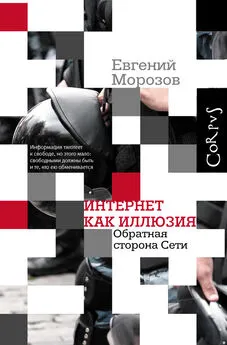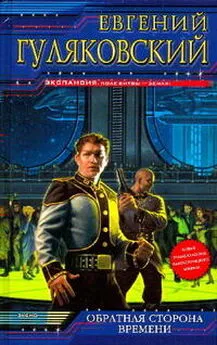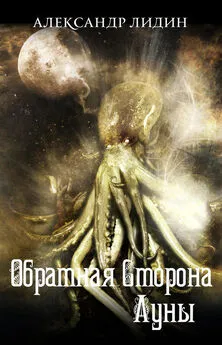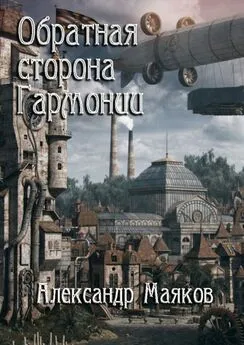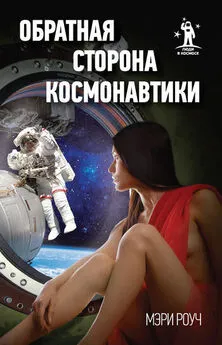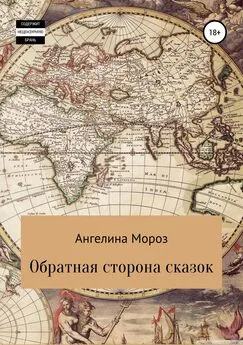Евгений Морозов - Интернет как иллюзия. Обратная сторона сети
- Название:Интернет как иллюзия. Обратная сторона сети
- Автор:
- Жанр:
- Издательство:Array Литагент «Corpus»
- Год:2014
- Город:Москва
- ISBN:978-5-17-084792-1
- Рейтинг:
- Избранное:Добавить в избранное
-
Отзывы:
-
Ваша оценка:
Евгений Морозов - Интернет как иллюзия. Обратная сторона сети краткое содержание
Интернет как иллюзия. Обратная сторона сети - читать онлайн бесплатно полную версию (весь текст целиком)
Интервал:
Закладка:
Oushakine, S. A. The Terrifying Mimicry of Samizdat // Public Cul-ture 13, no. 2 (2001): 191.
Palmer, M. Breaking the Real Axis of Evil: How to Oust the World’s
Last Dictators by 2025. Lanham, MD: Rowman & Littlefield, 2003. Patterson, E., and J. Amaral Presidential Leadership and De-mocracy Promotion // Public Integrity 11, no. 4 (2009): 327–346.
Pierskalla, J. H. Protest, Deterrence, and Escalation: The Strategic Calculus of Government Repression // Journal of Conflict Resolution 54, no. 1 (2010): 117.
Posner, M. H., and A. Ross Briefing on Internet Freedom and 21 st Century Statecraft . U. S. Department of State, Washington, DC, January 22, 2010.
Puddington, A. Broadcasting Freedom: The Cold War Triumph of Radio Free Europe and Radio Free Liberty . Lexington: University Press of Kentucky, 2000.
Ray, J. L., and B. Russett The Future as Arbiter of Theoretical Controversies: Predictions, Explanations and the End of the Cold War // British Journal of Political Science 26, no. 4 (1996): 441–470.
Reagan Urges “Risk” on Gorbachev: Soviet Leader May Be Only Hope for Change, He Says // Los Angeles Times, June 13, 1989.
Rosati, J. A. A Cognitive Approach to the Study of Foreign Policy // Foreign Policy Analysis: Continuity and Change in Its Second
Generation (1995): 49–70.
Rose, R., and D. C. Shin Democratization Backwards: The Prob-lem of Third-Wave Democracies // British Journal of Political Science 31, no. 2 (2001): 331–354.
Said, Edward Hey, Mister, You Want Dirty Book? // London Review of Books, September 20, 1999.
Saunders, D. In Czechoslovakia, Human Network Made the Message
Go Viral // Globe and Mail (Toronto), October 29, 2009. Saxonberg, S. The “Velvet Revolution” and the Limits of Rational
Choice Models // Czech Sociological Review 7, no. 1 (1999): 23–36. Schipani-AdÚriz, A. Through an Orange-Colored Lens: Western
Media, Constructed Imagery, and Color Revolutions // Demokra-tizatsiya: The Journal of Post-Soviet Democratization 15, no. 1 (2007): 87–115.
Schmitter, P. C., and T. L. Karl What Democracy Is … and Is Not // Journal of Democracy 2, no. 3 (1991): 75–88.
Schmitter, P. C., and J. Santiso Three Temporal Dimensions to the Consolidation of Democracy // International Political Science Re-view/Revue internationale de science politique 19, no. 1 (1998): 69–92.
Senor, D., and C. Whiton Five Ways Obama Could Promote Freedom in Iran // Wall Street Journal, June 17, 2009.
Shah, N. From Global Village to Global Marketplace: Metaphorical Descriptions of the Global Internet // International Journal of Me-dia and Cultural Politics 4, no. 1 (2008): 9–26.
Shane, S. Dismantling Utopia: How Information Ended the Soviet Union . Chicago: I. R. Dee, 1995.
Sharman, J. C. Culture, Strategy, and State-Centered Explanations of
Revolution, 1789 and 1989 // Social Science History 27, no. 1 (2003). Shimko, K. L. Metaphors and Foreign Policy Decision Making // Po-litical Psychology 15, no. 4 (1994): 655–671.
Shimko, K. L. Psychology and Cold War History: A Review Essay // Political Psychology 15, no. 4 (1994): 801–806.
Shimko, K. L. Reagan on the Soviet Union and the Nature of Inter-national Conflict // Political Psychology. 13, no. 3 (1992): 353–377.
Shirk, S. L. Changing Media, Changing Foreign Policy in China //
Japanese Journal of Political Science 8, no. 1 (2007): 43–70. Silitski, V. What Are We Trying to Explain? // Journal of Demo-cracy 20, no. 1 (2009): 86–89.
Snyder, R. S. The End of Revolution? // Review of Politics 61, no. 1 (1999): 5–28.
Sontag, S. Illness as Metaphor; and AIDS and Its Metaphors . New York: Picador, 2001.
Specter, A. Attack the Cyberwalls! // Pittsburgh Post-Gazette, July 7, 2009.
Sterling, B. Triumph of the Plastic People // Wired, January 22, 1995. Stier, K. U. S. Girds for a Fight for Internet Freedom // Time, Febru-ary 6, 2010.
Sunstein, C. R. Hazardous Heuristics // University of Chicago Law Review 70, no. 2 (2003): 751–782.
Suri, J. Explaining the End of the Cold War: A New Historical Consen-sus? // Journal of Cold War Studies 4, no. 4 (2002): 60–92.
Sweller, J., Mawer, R. F., and W. Howe Consequences of His-tory-Cued and Means-End Strategies in Problem Solving // Ameri-can Journal of Psychology 95, no. 3 (1982): 455–483.
Tait, R. Hardliners Turn on Ahmadinejad for Watching Women Danc-ers // Guardian, December 5, 2006.
Tetlock, P. E., and C. McGuire Cognitive Perspectives on Fo-reign Policy / In: Long, S., ed. Political Behavior Annual . Boulder: Westview, 1986.
Tilly, C. Trust and Rule // Theory and Society 33, no. 1 (2004): 1–30. Tsui, L. The Great Firewall as Iron Curtain 2.0 : The Implications of
China’s Internet Most Dominant Metaphor for US Foreign Policy . Paper presented at 6th annual Chinese Internet Research Confe-rence, University of Hong Kong, June 13–14, 2008. jmsc.hku.hk/ blogs/ circ/ files/ 2008/ 06/tsui_lokman.pdf.
Tsui, L. An Inadequate Metaphor: The Great Firewall and Chinese In-ternet Censorship // Global Dialogue 9, no. 1–2 (2007).
Ungar, S. Misplaced Metaphor: A Critical Analysis of the Knowledge Society // Canadian Review of Sociology/Revue canadienne de so-ciologie 40, no. 3 (2003): 331–347.
Vasina, J. I. Transformation of Eastern Europe in 1989 : Impacts of Information, Communications Technology and Globalization
Process on Change . Master’s thesis, Excelsior College, March 7, 2007.
Vertzberger, Y. Y. I. Foreign Policy Decisionmakers as Practical-Intuitive Historians: Applied History and Its Shortcomings // Inter-national Studies Quarterly 30, no. 2 (1986): 223–247.
Way, L. The Real Causes of the Color Revolutions // Journal of Democ-racy 19, no. 3 (2008): 55–69.
Way, L. A., and S. Levitsky Linkage, Leverage, and the Post-Communist Divide // East European Politics and Societies 21, no.1 (2007): 48.
Wells, W. G., Jr. Politicians and Social Scientists: An Uneasy Rela-tionship // American Behavioral Scientist 26, no. 2 (1982): 235. Wyatt, S. Danger! Metaphors at Work in Economics, Geophysiology, and the Internet // Science, Technology & Human Values 29, no. 2 (2004): 242.
Youngs, R. European Approaches to Democracy Assistance: Learning the Right Lessons? // Third World Quarterly 24, no. 1 (2003): 127–138.
Глава 3. Оруэлл и “ржачные котики”America’s Emobyte Deficit // Economist, November 27, 2007.
Ballard, J. G. “Aldous Huxley: An English Intellectual” by Nicholas
Murray // Guardian, April 13, 2002.
Barboza, D. Internet Boom in China Is Built on Virtual Fun // New York
Times, February 5, 2007.
Barboza, D. The People’s Republic of Sex Kittens and Metrosexuals //
New York Times, March 4, 2007.
Berdahl, D. Where the World Ended: Re-unification and Identity in the
German Borderland . Berkeley: University of California Press, 1999. Betts, P. The Twilight of the Idols: East German Memory and Material
Culture // Journal of Modern History 72, no. 3 (2000): 731–765. Breitenborn, U. “Memphis Tennessee” in Borstendorf: Boundaries Set and Transcended in East German Television Entertainment // Histo-rical Journal of Film, Radio and Television 24, no. 3 (2004): 391–402.
Chang, Anita Some Internet Porn Sites in China Now Accessible //
Associated Press, July 22, 2010.
Coleman, Peter Thinking About Life: A Brave New World // Uni-ted Press International, July 22, 2002.
Cooper, Robert Freedom for Sale: How We Made Money and Lost Our Liberty by John Kampfner / Democracy Kills by Humphrey Hawksley // Sunday Times, September 6, 2009.
Daly, Peter M., et al., eds. Germany Reunified: A Five– and Fifty-Year Retrospective . New York: P. Lang, 1997.
Darnton, R. Censorship, a Comparative View: France, 1789 – East Germany, 1989 // Representations (1995): 40–60.
Daves, William Is It Aldous Huxley or George Orwell? // New Statesman, August 1, 2005.
Demich, Barbara For Chinese, Getting into Harvard Is a Class Act // Los Angeles Times, June 4, 2010.
Despite Authoritarian Rule, Myanmar Art Grows // New York Times, March 25, 2010.
DeYoung, Karen U. S. Media Campaign Has Failed to Influence Cuba, Senators Say // Washington Post, May 4, 2010.
Dittmar, C. GDR Television in Competition with West German Pro-gramming // Historical Journal of Film, Radio and Television 24, no. 3 (2004): 327–343.
Eickelman, D. F. Islam and the Languages of Modernity // Daeda-lus 129, no. 1 (2000): 119–135.
Farrer, J. A Chinese-Led Global Sexual Revolution // Contexts 7, no. 3 (2008): 58–60.
Forney, Matthew China’s Loyal Youth // New York Times, Ap ril 13, 2008.
For the Young Hillary Rodham, Which Individuals and Books Were Most
Influential? // Pittsburgh Post-Gazette, April 11, 1993. Fukuyama, Francis Our Posthuman Future: Consequences of the Bio-technology Revolution . New York: Farrar, Straus and Giroux, 2002.
Fulbrook, Mary History of Germany, 1918–2000 : The Divided Nation. 2nd ed. Malden, MA: Wiley-Blackwell, 2002.
Fung, A. “Think Globally, Act Locally”: China’s Rendezvous with MTV // Global Media and Communication 2, no. 1 (2006): 71. Gleye, Paul Behind the Wall: An American in East Germany, 1988—
1989. Carbondale: Southern Illinois University Press, 1991. Gordon, Wendy J. Listen Up, Ready or Not // New York Times,
November 21, 1993.
Hargittai, E. Digital Na (t) ives? Variation in Internet Skills and Uses Among Members of the Net Generation // Sociological Inqui-ry 80, no. 1 (2010): 92–113.
Havel, VÁclav, et al. The Power of the Powerless: Citizens Against the State in Central-Eastern Europe . John Keane, ed. Armonk, NY: M. E. Sharpe, 1985.
Hendelman-Baavur, L. Promises and Perils of Weblogistan: Online Personal Journals and the Islamic Republic of Iran // Middle East Review of International Affairs 11, no. 2 (2007): 77.
Hesse, K. R. Cross-Border Mass Communication from West to East Germany // European Journal of Communication 5, no. 2 (1990): 355.
Hille, Kathrin, and Robin Kwong Chinese Consumers Opt for Bigger TVs than American Counterparts // Financial Times, Oc-tober 24, 2009.
Hirschman, A. O. Exit, Voice, and the Fate of the German Demo-cratic Republic: An Essay in Conceptual History // World Politics (1993): 173–202.
Hoff, P., and W. MÜhll-Benninghaus Depictions of America in GDR Television Films and Plays, 1955–1965 // Historical Journal of Film, Radio and Television 24, no. 3 (2004): 403–410.
Hoff, P., and L. Willmot Continuity and Change: Television in the GDR from Autumn 1989 to Summer 1990 // German History 9, no. 2 (1991): 184.
Huxley, Aldous Brave New World and Brave New World Revisited . New York: HarperCollins, 2004.
Iran Pours Oil Fund Billions into Wooing Disaffected Youth // Indepen-dent, September 1, 2005.
Читать дальшеИнтервал:
Закладка:
